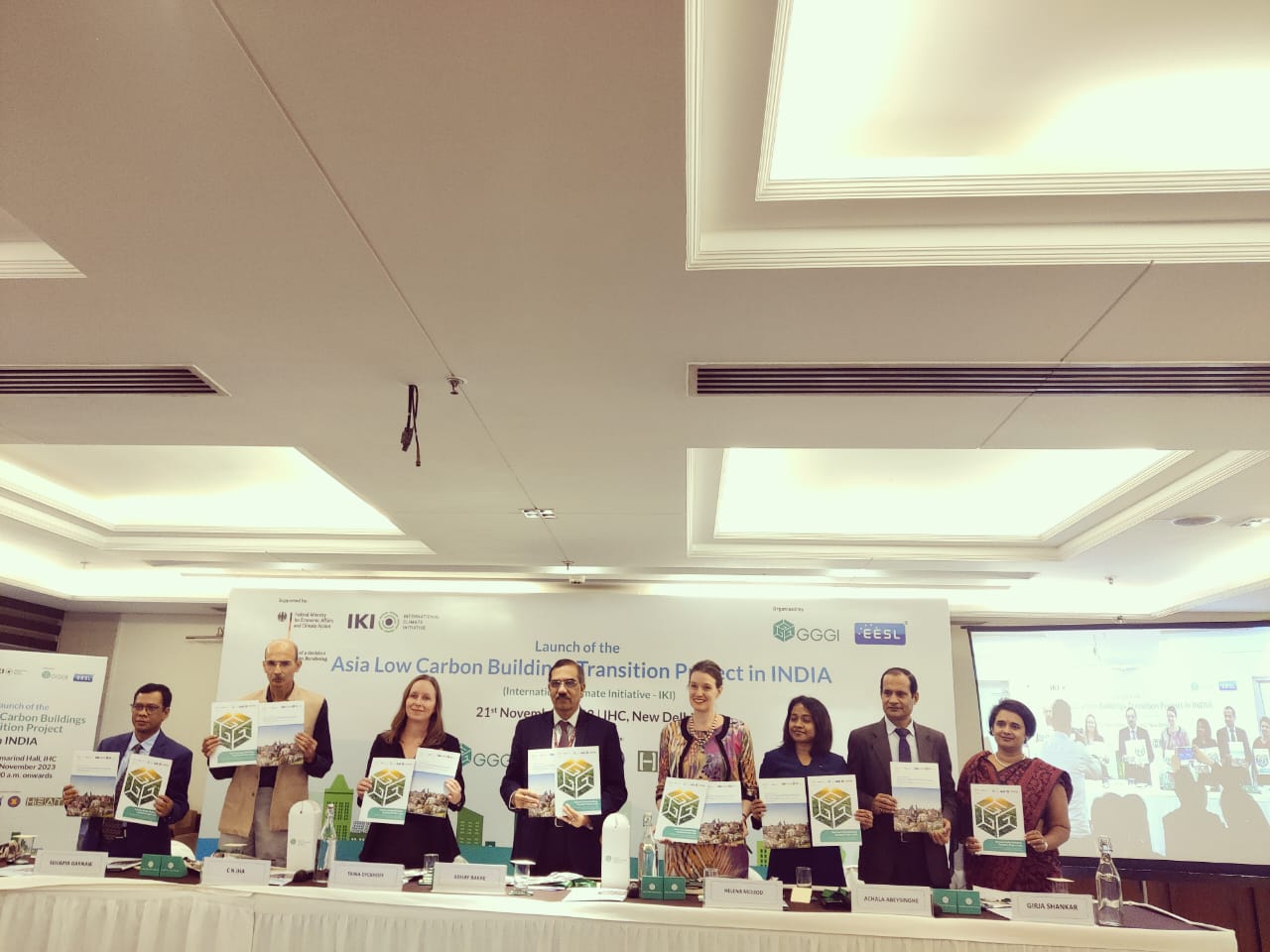GGGI Partners with EESL to Implement Asia Low Carbon Buildings Transition Project in India

New Delhi– Energy Efficiency Services Limited (EESL), a joint venture of Public Sector Undertakings, in collaboration with the Global Green Growth Institute (GGGI), an international intergovernmental organization, announced the launch of the Asia Low Carbon Buildings Transition (ALCBT) Project in India. Operating under the guidance of the Ministry of Housing and Urban Affairs (MoHUA) as the nodal ministry, this strategic initiative aims to combat the unprecedented surge in peak electricity demand in the country, primarily propelled by the escalating need for cooling solutions. The Government of Germany through its Federal Ministry for Economic Affairs and Climate Action (BMWK) is funding this project under the International Climate Initiative (IKI).
Join PSU Connect on WhatsApp now for quick updates! Click here
 Read Also : JSW Infra’s shares surges after receiving construction order from Syama Prasad Mookerjee Port
Read Also : JSW Infra’s shares surges after receiving construction order from Syama Prasad Mookerjee Port
EESL, in collaboration with GGGI, will undertake a range of activities to address the pressing challenges associated with the surging demand for electricity in the building sector. One of the key components of the ALCBT project implementation across three states - Kerala, Haryana, Uttar Pradesh, involves the assessment of 400 buildings (200 old and 200 new) in Kerala; 600 buildings in Haryana (400 old and 200 new); and 600 buildings in Uttar Pradesh (400 old and 200 new). Additionally, 20 Energy-Efficient Cooling Retrofits will be deployed in each of the three states. The Haryana Renewable Energy Development Agency (HAREDA), the Department of Environment, Forest & Climate Change (DoEF&CC), and the Energy Management Center (EMC) are actively supporting this project to ensure its effective implementation within their respective provinces.
Mr. Vishal Kapoor, Chief Executive Officer, EESL & CESL, added “The Asia Low Carbon Buildings Transition (ALCBT) Project is a timely opportunity to champion sustainable building practices. In collaboration with the Global Green Growth Institute (GGGI), we are geared to address the challenges of surging electricity demand and contribute significantly to carbon emission reduction. A key focus includes retrofitting air conditioning systems in 60 Indian buildings, demonstrating our commitment to energy efficiency. The project also advocates bulk procurement strategies in two other countries, fostering the global adoption of sustainable building practices. Despite challenges, our strategic partnerships position the ALCBT Project as a transformative force, propelling India toward a low-carbon future.”
As part of the project, EESL will also provide training to approximately 600 professionals and individuals on the use of Low-Carbon Tools and Building Energy Efficiency. This training initiative extends not only across India but also encompasses two other countries. Furthermore, EESL will play a pivotal role in overseeing pilot demonstrations focused on sustainable cooling systems. Specifically, these demonstrations will be conducted in 60 buildings within India and 40 buildings in two other countries. The primary objective is to showcase the efficacy of Demand Aggregation and Bulk Procurement, with a collective target of 100 buildings. The learnings and the achievements from this project will be further utilized for replication in other states.
Commenting on the occasion, Helena McLeod, Deputy Director-General, and Head of the Green Growth Planning & Implementation (GGP&I), Global Green Growth Institute, said, “India is facing an unparalleled surge in peak electricity demand, predominantly driven by the escalating need for cooling solutions. The ALCBT Project is a crucial step towards aligning our building practices with global sustainability goals. By integrating ALCBT tools and training programs, and focusing on robust policy recommendations, we aim to catalyze a paradigm shift in how we approach energy efficiency in the building sector. The Asia Low Carbon Buildings Transition (ALCBT) Project is a great opportunity for GGGI
together with the Government of India to take our joint commitments forward. Today we had wonderful discussions around this project’s outcomes, and I am sure this project will strengthen India’s Energy Conservation Buildings Codes (ECBC) and create an entire ecosystem for low carbon building infrastructure.”
Ms. Taina Dyckhoff, Head of Division for Climate and Environment of the German Embassy New Delhi, added: “India is one of the IKI priority countries. We are happy to continue the successful cooperation with this new project, dedicated to low carbon buildings. The German Federal Government values the long-standing bilateral cooperation with India in the field of climate and biodiversity protection. This project is part of our strong Indo-German Green and Sustainable Development Partnership (GSDP). We continue to promote green and sustainable development through our cooperation projects as well as high-level policy dialogues in a whole of government approach.”
The ALCBT Project is poised to yield substantial benefits, with the following key expected outcomes:
- Carbon Emission Reductions: The project aims to achieve a significant reduction of 1.2 million TCO2eq. This underscores our commitment to contributing to India's climate goals and fostering global sustainability.
- Financial Mobilization: GGGI will mobilize a substantial € 140 million in all five countries including India, for low-carbon building projects through innovative mechanisms such as Taxonomy, MRV, and (super) ESCO pilots.
- Project Pipeline Generation: This includes a corpus of € 100 million for developing a low carbon project pipeline using MRV tools/taxonomy. Another € 20 million will be raised through proposals to leverage climate funds. The remaining € 20 million shall be mobilized through private ESCOs.
